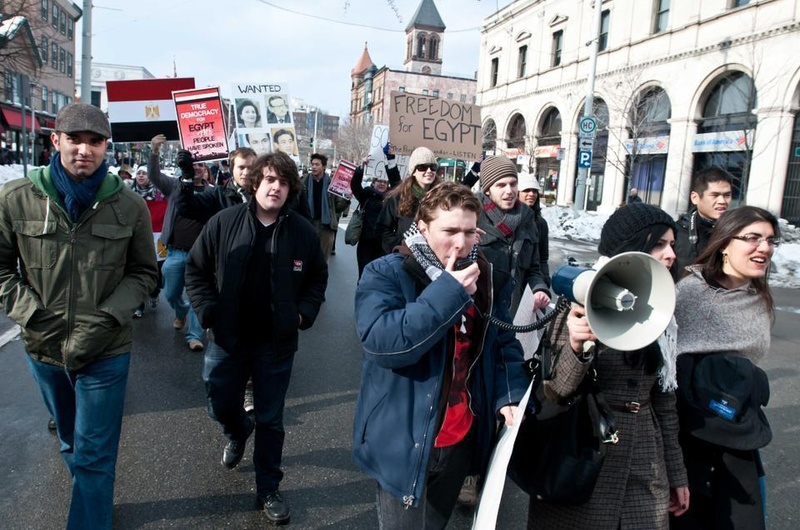With Egyptian flags and posters of President Hosni Mubarak in hand, several hundred Boston-area residents showed up in Harvard Square Saturday afternoon to protest Mubarak’s 30-year regime and his violent response to the widespread uprisings in the Arab republic.
It was the first Boston-area protest since the unrest began in Egypt last Tuesday, inspired by the successful ousting of Tunisian president Zine El Abidine Ben Ali 11 days prior.
Egypt’s Mubarak has refused to step down as president, deploying soldiers and police with tear gas and rubber bullets to contain the crowds that have formed across Egypt.
Marihan Hashesh, a young interior designer from Somerville who organized the event, said she anticipated about 30 people to join her in Harvard Square. Instead, 500 people marked that they planned to attend the event she created on Facebook.
The event soon outgrew its setting, and Cambridge Police asked the demonstrators to relocate to Boston because the turnout was too large for Harvard Square. Escorted by several police cars, the protesters marched down Massachusetts Avenue and then down to the Boston Common, backing up traffic for several blocks.
Hashesh, who is of Egyptian descent and lived in Egypt for three years, said she organized the first protest in the Boston area to accommodate for those who could not travel to New York to join the demonstrations at the United Nations headquarters.
“Seeing what happened [in Egypt] broke my heart,” she said, explaining why she spearheaded the rally. The event drew protesters with young children, many of whom Hashesh said could not have attended a protest in another city.
Hasesh said that she chose Harvard Square because of an accommodating Cambridge police force and its long-standing tradition of hosting demonstrations. “Harvard Square is known for its protests,” she said, adding that the atmosphere in Cambridge represented a stark contrast to the events in Egypt.
“People here are smiling and happy because they have the right to protest,” she said. “In Egypt, they’re living it. Most of them know no other government.”
Hashesh’s use of Facebook to spread awareness of the event mirrored the use of social media to coordinate demonstrations throughout Egypt. But the day before the protest in Harvard Square, the Egyptian government took an unprecedented step by shutting down Internet access and cell phone services, restricting most communication with the outside world to landline phone calls.
Joshua Rubenstein, the Northeast Regional Director for Amnesty International, said the United States should center its stance around how the Egyptian government has infringed on human rights. “People have the right to communicate with each other,” he said, referring to the shutdown of Internet and cell phone services. “If they have an election, it should be an honest election.”
Sherry William, an Egyptian who graduated from Harvard Law School last year and attended the protest, said there was a sense of embarrassment that Tunisia, a country with one-tenth the population of Egypt, was the epicenter of the demonstrations that have spread across the Arab world. “It’s pretty surprising that such a small revolution inspired Egypt to act,” she said, dressed in red, white, and black to represent the Egyptian flag. “Traditionally, Egypt is the heart of the Arab world.”
Mina E. Khalil, an Egyptian JD candidate at Harvard Law School who was in Egypt until two Sundays ago, said he hoped the United States would take a stronger stance on a regime change and spent much of the rally leading the crowd in shouting “Hey Obama, you should know—Hosni Mubarak has got to go.”
Khalil, a Christian, stressed that the uprisings are pan-Egyptian, regardless of religion or age.
One woman also held up a sign that read, “Muslim, Christian, we’re all Egyptian.”
—Staff writer Michelle M. Hu can be reached at michellehu@college.harvard.edu.
Read more in News
Au Bon Pain Remodels Interior













